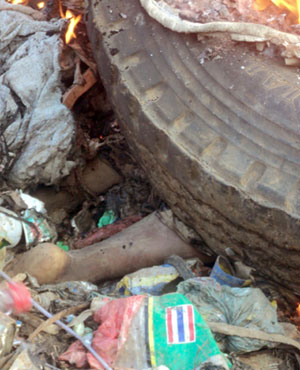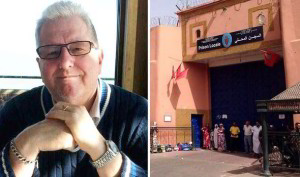Appeals Court To Hear Claim for Secrecy Demands for Telecom Records
By Lyndsey Kelly
Impunity Watch Reporter, North America
WASHINGTON, D.C., United States of America – On 8 October 2014, the United States Court of Appeals addressed a lawsuit challenging the Federal Bureau of Investigation’s ability to force Internet and telecommunications firms to produce customer records without revealing the reasoning behind the governments demand.
At the hearing, a three-judge panel of the 9th Circuit considered the First Amendment as it relates to national security matters. A lower court in San Francisco, previously reviewed the question of whether recipients of national security letters can discuss their nature under the First Amendment. The lower court held that such gag orders by the government were unconstitutional.
The government contends that secrecy is vital to the national security of the United States, because cases dealing with such could have the potential effect of endangering an individual’s physical safety. Additionally, an attorney for the U.S. Department of Justice, Douglas Letter, stated that the FBI does not have the appropriate resources to review every case, which may have a national security interest to determine whether or not secrecy is warranted. Requiring such strict review would render the agency unable to function.
The plaintiff in the case before the 9th Circuit, claimed that the FBI’s gag order surrounding national security letters represents an “unprecedented grant of authority” and violates the First Amendment of the Constitution. Other tech companies have also filed suit against the government regarding how much information the companies can disclose about government surveillance. The companies include: Google Inc., Microsoft Corp, Facebook Inc., and Twitter Inc.
Judge Sandra Ikuta, who sat on the 9th circuit panel, states that the law may not violate the Frist Amendment right to free speech because the government only sought secrecy for information that impacts national security, it does not prohibit speech about information someone received independently.
For more information, please see the following:
BUSINESS INSIDER – U.S. Court To Hear Appeal Over Keeping U.S. Demands For Telecom Records Secret – 8 Oct. 2014.
REUTERS – Update 1 – Appeals Court Wrestles With Secret U.S. Demands For Telecom Records – 8 Oct. 2014.
REUTERS – U.S. Court To Hear Appeal Over Keeping U.S. Demands For Telecom Records Secret – 8 Oct. 2014.
YAHOO NEWS – Appeals Court Wrestles With Secret U.S. Demands For Telecom Records – 8 Oct. 2014.
British man returns home after being jailed in Morocco for sexual orientation
MARRAKESH, Morocco
Ray Cole, and 70 year old British citizen, was jailed in Morocco for “homosexual acts.” Cole travelled to Morocco for a vacation with a Moroccan man, Jamal Jam Wald Nass, with whom he had developed an online relationship with in the preceding months. The two had explored Morocco; Cole had frequently updated his Facebook with pictures of the sites and cities he visited with his partner. On September 18th, the two men were arrested at a bus stop in Marrakesh, after a police officer had approached the men for suspected homosexuality. After being brought to the police station, Cole and Nass were jailed for being gay.
Ray Cole- Photo courtesy of Express UK
Cole reveals that the conditions in the jail were horrible. He was forced to sleep on the ground, due to over-crowding, with little more than a blanket. Everything else, including his glasses, were taken away. Cole, who was jailed for nothing more than his sexual orientation, was held with men who had committed serious crimes, including murder. The British consulate worked actively to get Cole home to his family, and on October 2nd, he finally boarded a flight back to the United Kingdom.
While Cole returned home to a country that allows citizens to exercise their freedom of sexuality, this episode underlines a serious cultural barrier for homosexuals in Muslim countries—homosexuality is criminalized. As a result, gay and lesbian individuals are forced to keep their identity an absolute secret, or deal with the ramifications of being gay in a Muslim country, which can include prison, stoning, and death. Furthermore, as briefly touched upon, the crime of homosexuality puts offenders in the same category as some of the worst criminals, including murderers. How can these two crimes be reconciled as equally egregious?
Film maker Abdellah Taïa uses his work to explore the pain, challenges, and heartache of being gay in Morocco, documenting how a mob had yelled outside of his home about raping him, and not a single member of his family defended him. This sense of abandonment is not uncommon for homosexuals in Morocco and other Muslim countries. Taïa urges that something must change legally and culturally in these countries, as the criminalization of homosexuality is not sustainable.
So while Ray Cole returned home to Britain after the ordeal of being jailed for homosexuality, many are still relegated to silence in order to preserve their freedom and lives. While homosexuality remains a crime in Morocco, people that identify as homosexuals will not be able to live without the threat of violence. Will the attention brought to the situation in Morocco by Cole’s experience benefit the homosexual community in this Muslim country?
For more information, please visit:
The Guardian- British man jailed for four months for ‘being gay’– Oct 5, 2014
The Guardian- Morocco releases British tourist jailed for ‘homosexual acts’– Oct 7 2014
The Guardian- Moroccan partner jailed with Briton for ‘homosexual acts’ freed– Oct 9, 2014
The Guardian- Abdellah Taia: In Arab countries, homosexuality is a crime. This has to change– Oct 3, 2014
Pakistani Activist Becomes Youngest Recipient of the Nobel Peace Prize
By Kathryn Maureen Ryan
Managing Editor, Impunity Watch
ISLAMABAD, Pakistan – The Nobel Peace Prize was awarded today to Pakistan’s Malala Yousafzai, a fierce advocate for girl’s education in Pakistan and around the world. At 17 years old Malala Yousafzai is the youngest recipient of the Nobel Peace Prize and Pakistan’s first Nobel Peace Prize laureate. Malala first came to attention in 2009 when she wrote an anonymous blog for BBC Urdu about life under Taliban rule in north-west Pakistan. Two years ago she was shot by Taliban gunmen for her advocacy while she was boarding her school bus in the Swat Valley.After recovering from life-saving surgery, she has taken her campaign for the right to education for all peoples, regardless of gender, to the international stage, giving a speech last year at the United Nations. Pakistani Prime Minister Nawaz Sharif congratulated Malala Yousafzai, calling her the Pride of Pakistan. “Her achievement is unparalleled and unequalled. Girls and boys of the world should take the lead from her struggle and commitment,” he said in a statement.

Young students in Malala’s home region were thrilled with Friday’s announcement “There are not many people in this world — in fact, no one — who is as brave as Malala,” said Badrai Khan, 19, a college student from Swat, Malala’s home region. “This award is an achievement for all girl students of Pakistan.” Khan said”Tomorrow, when I go to school, I’ll be a different, more confident girl, thanks to Malala and this recognition.”
Malala Yousafzai learned that she was awarded the Nobel Peace Prize while she was in chemistry class in England on Friday morning, she said. She wasn’t expecting to get the award. “I’m proud that I’m the first Pakistani and the first young woman or the first young person getting this award.” Malala has stated that she is happy to have been given the opportunity to go to school, thanking her father for not clipping her wings and allowing her to have the same opportunities as boys in her community.
The Nobel Peace Prize was also awarded to India’s Kailash Satyarthi. Both Nobel Laureates were cited by the Norwegian Nobel Committee “for their struggle against the suppression of children and young people and for the right of all children to education.” According to the Nobel Committee, Satyarthi has been known to participate in peaceful protests and demonstrations calling for an end to child exploitation. At the age of 26 he gave up a career in electrical engineering to devote his life to advocating for children, even raiding factories where child workers were held captive. In 1994 Satyarthi started a program called “Rugmark,” now known as GoodWeave International, in which rugs are certified and labeled to be child-labor free. Satyarthi started the program because of the high level of child exportation in the rug industry, children have been historically expatiated in several countries around the world where rugs are woven.
In 2004 Satyarthi said his home and office have been attacked, but he said the danger is worth it. “If I was not fighting against child labor, I don’t know what else I could do. It was always in my heart, I could not live without that,” he said at the time. “It’s really a kind of spiritual feeling which is difficult to explain,” Satyarthi said. “And the smiles come on the face of the children when they realize that they are free.”
The chairman of the Norwegian Nobel Committee commented on the theme of child rights that is the focus of the work of this year’s Nobel laureates, both from historically divided region. He explained that “children must go to school, not be financially exploited.”
For more information please see:
ABC News – 5 Things to Know About Nobel Prize Winner Kailash Satyarthi – 10 October 2014
BBC News – Malala and Kailash Satyarthi Win Nobel Peace Prize – 10 October 2014
CNN International – Malala Yousafzai and Kailash Satyarthi Share Nobel Peace Prize – 10 October 2014
USA Today – Malala’s Nobel Is ‘For All Girl Students Of Pakistan’ – 10 October 2010
Seven Arrested for the Murder of Suspected Witches
By: Danielle L. Cowan (Gwozdz)
Impunity Watch Senior Desk Operator, Africa
DODOMA, Tanzania – Police in Tanzania have arrested and charged twenty-three people for killing seven people for alleged “witchcraft.”

Villagers burned the victims alive.
“They were attacked and burnt to death by a mob of villagers who accused them of engaging in witchcraft,” the western Kigoma region police chief said.
“Five of those killed were aged over 60, while the other two were aged over 40,” he added.
Among those killed was the local traditional doctor, or called the “witch doctor.”
Relatives of those killed described the horrific scenes of their family member who had been killed. These images described members hacked with machetes or burned almost beyond recognition.
“When I returned home in the evening, I found the body of my mother lying 10 meters away from our house, while the body of my father was burnt inside the house,” Josephat John told one newspaper.
A Tanzanian human rights group has estimated that about 500 “suspected witches” are killed in Tanzania annually.
BBC has stated reports between 2005-2011 claim more than 3,000 people have been killed after being accused of witchcraft.
One of the villagers detained for the murder is the village local leader.
The village is now empty. The leader of the Murufiti village told the BBC that “[m]en and women have run away from the village. Even child are not there. . . . Everyone was scared of the event, and others feared police search.”
Among the targeted villagers, it has been claimed that villagers with albinism (“albino”) have been targeted because it is believed that their body parts used for charms can bring good fortune and prosperity.
For more information, please visit:
BBC News – Tanzania arrests 23 over killing of seven ‘witches’ – 10 October 2014
Mail & Guardian – Seven accused of witchcraft burned alive in Tanzania – 10 October 2014
The Frontier Post – Seven witchcraft suspects burned to death in Tanzania – 10 October 2014
iAfrica – Seven burnt for witchcraft – 10 October 2014
news24 – 7 witchcraft suspects burned to death in Tanzania – 10 October 2014
